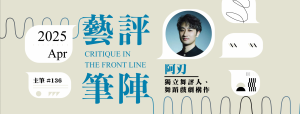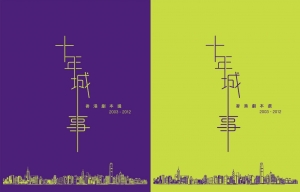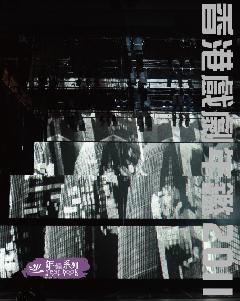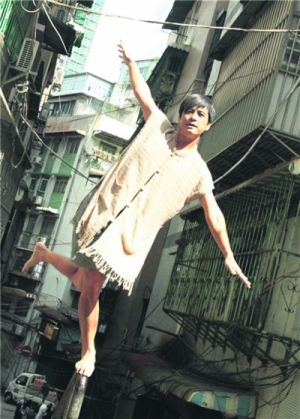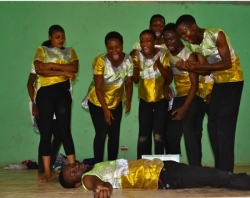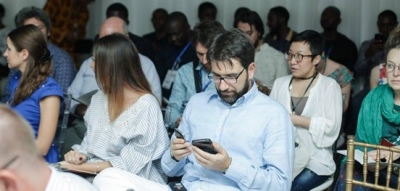2017年3月
Introduction
In an earlier work titled Negotiating Identity: Theatre, Performance and Criticism in Africa, I discussed the challenge of identity in post-colonial African theatre, which is faced with issues of cultural hybridization and post-colonialism. That publication also highlighted the dilemma facing the modern theatre critic who is schooled in European precepts yet needs to review a performance that, strictly speaking, is neither an indigenous African performance nor a European play. This paper shall elucidate the challenge faced by the modern African theatre critic using two performances that were staged on 1st March 2017 as part of the Lagos Theatre Festival.
Theatre in traditional African society is essentially a communal activity, which involves the whole community. It is not a subjective activity of an artist or group of artists. The messages that this kind of theatre communicates must necessarily be in tune with the overriding interest of the community. In this kind of theatre, the audience is active and engages in criticism of the performance as the show progresses. The role of the critic therefore is not an exclusive preserve of a lone literary critic who writes his reviews in his private space. In Africa, even when an individual functions as a critic, his work is democratized to the extent that he performs his observations. Often, he is also a performer who could take over the performance space at will in the course of a public performance to redirect the action on stage.
The above contrasts significantly with the modern conception of criticism, which to Obafemi is:
“…the art of interpreting works of art, taking the liberty to offer meanings and evaluating plays and performance was first, to conventional knowledge from the West embarked upon by Aristotle. He was not a playwright but offered models which has since been regarded as pristine theories of the theatre; of tragedy, considered in Greek and Western drama as the most serious form of drama.”
A scene from a minimalist play by NYSC Drama Group, Kebbi State. (Photo Credit: Courtesy NYSC DHQ, Abuja)
As has been argued in Negotiating Identity: Theatre, Performance and Criticism in Africa, since African theatre aesthetics differ significantly from those espoused by Aristotle, it follows that the critical canons for evaluating theatrical performances also differ. This difference makes the job of the modern theatre critic intriguing in Africa as can be seen in two recent theatre experiences reviewed below.
Clash of Critical Cannons
In a syncretic theatre environment, navigating through the maze of which aesthetic canons to apply in reviewing a performance that is, strictly speaking, neither African nor Western can be arduous. This reality manifested itself recently in Lagos, Nigeria. As part of the 2017 Lagos Theatre Festival (LTF), on 1st March, Wednesday, I accompanied three visiting colleagues and international theatre critics from Sweden, Romania and Hong Kong alongside 20 young Nigerian theatre critics to watch two performances: Lagos Na Wa at the Recital Hall, MUSON Centre, Lagos; and Vesta Violins’ Classical Wednesdays at the Banana Island School, Ikoyi, Lagos. The International Association of Theatre Critics selected the two performances as part of the field exposure for the 20 young critics under its 2017 LTF-Young Critics professional mentoring programme.
Lagos Na Wa is a fast-moving, comic, improvisational performance created within the total theatre mould. It subsumes songs, drama, buffoonery, dance, mime and music. The performance utilizes pidgin English, Yoruba and Nigeria blend of the English Language. Lagos Na Wa is a satire that expresses the frustration of most African youths who are exposed to untold harassments, exploitations and ultimately made to indulge in dubious acts in order to survive in the urban centres. The episodic performance utilizes popular songs, musical tunes, drama, day-to-day happenings, and characters recognizable in the daily hustle and bustle of the mega cities like Lagos. Its strongest comment is that the failure of government at all levels has greatly compromised the welfare and security of its citizens.
A cross section of the mixed audience during the 2017 Lagos Theatre Festival performance on 1st March 2017. (Photo Credit: Courtesy British Council, Nigeria)
During the tripartite post-performance interaction between: the visiting international critics; the young Nigerian critics; and cast of Lagos Na Wa, I noticed an interesting development. While most of the young Nigerian critics found it easy to relate with the performance as a meaningful artistic engagement, my international colleagues found it difficult to classify what they just watched. Could it be a musical drama? A rehearsal in progress? Or arrant balderdash? It was certainly not “theatre” as far as the western theatre precepts are concerned. One of the European critics submitted emphatically that “there was no spectacle in this at all, and spectacle is a basic element of theatre”. On reading the review of the same performance by the young critics the next day, I realized that even the Nigerian critics who were connected with the actions of the performance were not in agreement on how to classify or evaluate it. They ended up with some of the following contradictory submissions.
“The production style is largely eclectic, employing popular hit songs to deepen the message of the play…Generally, the directing and artistic vision of the production is good and to a large extent delivers the message of the play.” – Shadrach Teryila Ukuma (https://guardian.ng/art/lagos-na-wa-just-like-awkward-rhythm-of-the-city/)
“This is a comedy of errors with a charm that makes it look like a performance thrown together casually.” – Ifeoluwa Nihinlola (https://guardian.ng/art/lagos-na-wa-the-casual-rhythm-of-lagos/)
“Lagos Na Wa is a musical drama, that highlights a lot of vices. The script is impressive, direct and detailed. The musicals ranging from contemporary Nigerian hits, speak where dialogue is mute.” – Olamide Santos, IATC-LTF Report
“It is a mosaic of dance, music and drama… It’s a portrait – perhaps a painting achieved in broad strokes would be more appropriate – of rural-urban migration, corruption, sexual health and safety, and a repertoire of other societal issues…” – Falade Adeoye Dennis, IATC-LTF Report
What is interesting in the above reviews of Lagos Na Wa is that the discordant submissions of the critics was basically as a result of the application of different aesthetic lens. Indeed the critical cannon utilized to review a performance determines greatly the ultimate interpretation of the performance. Surely if one is evaluating Lagos Na Wa performance from the Eurocentric lense, the likely conclusion will be that the performance was anything but a play. However, from the African perception of theatre as a story-telling performance whose relevance is measured by the extent to which it reflects and impacts life, Lagos Na Wa stands out as “good theatre”.
Vesta Violins’ Classical Wednesdays, on the other hand, was a concert that featured an international ensemble, which comprised Oana Craciunescu (Romania), Koumait Saleh (Syria) and a host of Nigerians led by Rosalyn Aninyei and the two amazing vocalists: Guchi Egbunine and Ranti Ihimoyan. The concert was just what a performance of “early music” should be: exciting, warm, soul searching, and nostalgic. The tones were no doubt beautifully executed with graceful ornaments, unimpeachable precision and Victorian panache. Ranti’s voice was eloquent, alluring, elastic and had this ringing purity, which kept the audience mesmerized. Her graceful spontaneity as a singer came to the fore as she added little ornaments to the repeated laughter phrase “hahahaha” in The Laughing Song which was eventually voted the best piece of the night by the audience.
Ranti Ihimoyan performing The Laughing Song in Vesta Violins’ Classical Wednesdays. (Photo Credit: Courtesy British Council, Nigeria)
The above review is based on my impressions as a critic who has tuned his mind to the conventional aesthetic criteria of what elements define good classical musical performances. It was gratifying to note that my three visiting international theatre critics who did not find “much theatre” in Lagos Na Wa, that we all watched few hours earlier, found “good theatre” in this concert. However, this was not the case with some of the young Nigerian critics who came to the concert armed with their African aesthetic canons. To such critics, the concert was extremely boring as there was not a single moment of the kind of “activity” in the boisterous Lagos Na Wa fashion. Indeed one of the critics whispered to me, “I am wondering what message is in all this? There was no dance, spectacular movement, familiar musical tone or anything that the average Nigerian audience member will recognize or connect to.” Of course, his concern is understandable when we appreciate the fact that utilitarian value of an art form, “meaning” or “the message” is an important element in African performance aesthetics.
Guchi Egbunine leading the orchestra during Vesta Violins’ Classical Wednesdays performance at the Banana Island School Recital Hall, Ikoyi, Lagos, on 1st March 2017. (Photo Credit: Courtesy British Council, Nigeria)
The African theatre aesthetics differ in many respects from those of the conventional European aesthetics. One of these is the African story-telling traditions and preferences for symbolism and epics as against the European emphasis on written dialogue and syllogism of linear plot. As far back as 1934, Antonin Artaud who was impressed by the kind of theatre he found in Asia decried the prostituting of theatre by the West in his Le theatre et son double thus:
“Why is it that in the theatre, at least in the theatre as we know it in Europe, for that matter in the West, everything that…doesn't obey expression by speech, by words, or if you wish, everything that is not contained in dialogue…is left in the background?” (Dukore, 76)
Indeed, the difference between the African conception of theatre and the European notion of “formal” theatre goes beyond the idea of orality versus the text. Every theatre seeks to entertain and engender communication between the performer and the audience. However, the approach towards entertainment and communication differs from one society to the other. As a cultural product, theatre is affected and shaped by the predominant aesthetic sense, goals and cultural realities of its creators. This presupposes that no two societies would have the same theatrical expressions in so far as the cultural realities and artistic goals of the creators differ.
The African theatre has what Ola Rotimi calls a “polaroid” character (referring to the instantaneous nature of their approval or lack of approval for any artistic product presented before them like the “polaroid camera” which has inbuilt processing image processing capability that produces a finished print rapidly after each exposure).
Unlike the “disciplined” audience in Europe who will patiently wait till the end of a scene or act to clap, or wait for the critic to dissect the performance in his the next day review, the African theatre audience gives it judgment as the performance goes on either by jeering at what it considers a bad performance or by clapping or hailing the performer there and then. Obafemi sums it thus:
“The critic of African drama had been the audience, which we refer to as participatory audience because they were also at once creators, dramatists and performers. In the oral performance mode, the critical aesthetics revolves around narration, inter-narration and re-narration on the basis of participatory theatrical engagement.”
Conclusion
Technology has reduced the world into a global village and introduced the concept of citizen journalism. This has ushered in an interesting convergence between the traditional African concept of audience as critic and the Eurocentric concept of criticism as the domain of the learned analyst who seats in his closet to write reviews of a production he watched the previous night for the consumption of the public via the mass media. Nowadays even in modern theatre, the audience has started reclaiming its traditional right of theatre criticism. What with the abundant possibilities of live streaming of theatre productions and growing practice where members of the audience engaged simultaneously in conversation with colleagues in the audience and indeed others outside the theatres via social media platforms as the performance progresses. The growing report of many successful digital theatre experiments where the audience members conversed among themselves or tweeted series of comments and images of scenes in theatre productions as actions proceeded on stage further confirms that perhaps the world is gradually returning to the traditional African concept of audience as critic. How much this digital revolution will affect theatre criticism as a professional still remains contentious but it is almost certain that the profession of criticism, like most others, will hardly remain the same in the succeeding decades.
Also with the increasing collapse of geographical boundaries, there is a conscious or unconscious negotiation of a global theatre idiom. This means that no theatre tradition should be content with an observer status. Thus, the African theatre should take advantage of the increasing opportunities to contribute towards shaping the character of global theatre practice.
The modern critic, like his traditional African counterpart, has a role to play in mediating this process. He should be knowledgeable on the similarities and peculiarities of various cultures and aesthetic canons indigenous to a people. He should be abreast with the reality of the dynamism of cultures so as to effectively track the daily conversation between cultures and the changes that emanate therefrom. Also, the critic needs to adhere to his professional ethics and develop adequate skills in knowing the appropriate lens to apply to performances he criticizes. This is necessary if the critic must be proficient and effective in making meaningful contributions towards enhancing the development of theatre as a catalyst for social change.
Works Cited
Dukore, Bernard F., Dramatic Theory and Criticism: Greeks to Grotowski, Florence, KY: Heinle & Heinle, 1974.
Hauptfleisch, Temple, “The Shaping of South African Theatre: An Overview of Major Trends” in: Arndt and Berndt, Words and Worlds. African Writing, Literature, and Society – A Commemorative Publication in Honor of Eckhard Breitinger. Africa World Press, 2007.
Mollel, Tololwa M., “African Theatre and the Colonial Legacy: Review of the East African Scene” in Utafiti: Journal of the Faculty of Arts and Social Sciences, vol. 7, no. 1, 1985, pp. 20-9. pdfproc.lib.msu.edu/?file=/DMC/African%20Journals/pdfs/Utafiti/vol7no1/aejp007001004.pdf.
Obafemi, Olu, “Politics of Theatre and the Theatre of Politics in Nigeria”, an unpublished paper presented at the maiden IATC International Theatre Critics Conference at the National Theatre, Lagos, 3rd March 2017.
Rotimi, Ola, in a lecture at Hall A1, University of Jos, Jos, Nigeria on March 12th 1986.
本網站內一切內容之版權均屬國際演藝評論家協會(香港分會)及原作者所有,未經本會及/或原作者書面同意,不得轉載。






